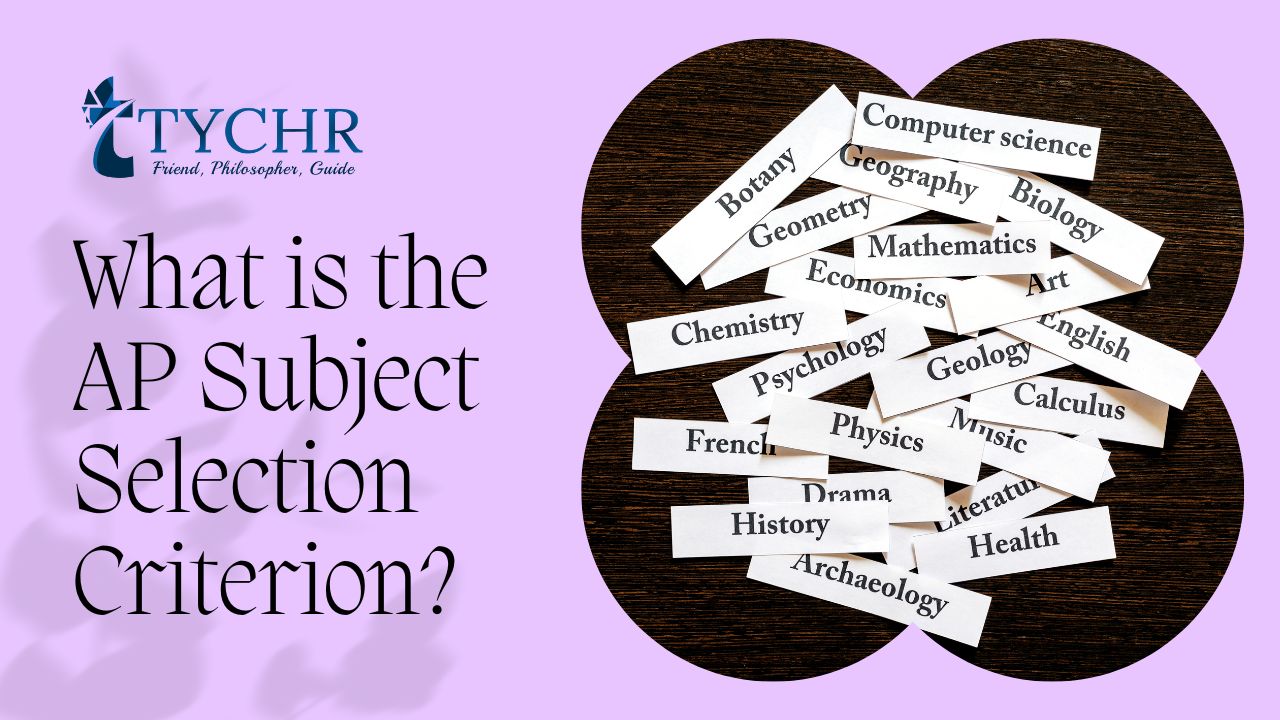Table of Contents
Choosing your high school courses can feel like an overwhelming ordeal. At first glance, all the options, course names, and new lingo can be very confusing. When it comes to advanced course selection for high school, there are a lot of factors to consider. One of the most common and challenging higher level exams that high school students take is the Advanced Placement, or AP exams. With lots of options on the horizon, and perhaps uncertainty about what you wish to study in the future, you may be confused about choosing your AP courses.
Choosing your AP courses and succeeding in them can be an effective way of showcasing your prowess in a certain area. A good place to start is thinking about what a typical course load looks like at your high school. In the college admissions process, you will be compared to other students from your school, so it is important to think about your course selection in that context. Your high school college counselor will detail the rigor of your course load in their letter of recommendation. Before you choose classes, talk to your counselor so that you understand the courses students at your school usually take. Ask which ones are considered the most challenging, and think about how you can select your courses to go above and beyond, separating yourself from the rest of the pack.
The AP Program offers college-level courses and exams that you can take in high school. Taking AP courses helps you on your path to college by giving you a chance to:
- College Credit: AP courses can potentially earn you college credit and advanced placement, allowing you to skip introductory courses and pursue more advanced coursework.
- College Admissions: AP courses can demonstrate your willingness to challenge yourself academically and your preparedness for college-level coursework. Many colleges and universities look favorably upon students who have taken and excelled in AP courses.
- Improved Skills: AP courses are designed to be challenging and rigorous, pushing you to develop critical thinking, analytical, and writing skills that will serve you well in college and beyond.
- Career Advancement: AP courses can help prepare you for future career opportunities by providing you with a strong foundation in a particular subject area. They can also demonstrate your commitment to learning and your dedication to your chosen field.
- Personal Growth: AP courses can be intellectually stimulating and rewarding, encouraging you to explore your interests and passions and develop a love of lifelong learning.
Choosing Your AP Courses:
There are 38 AP courses in disciplines such as the arts, English, history and social science, math and computer science, the sciences, and world languages and culture. You should choose an AP course based on what subjects you’re passionate about as well as what classes you do well in. Now that you know some of the benefits of taking AP, take a look at how you can enroll in an AP course.
See What’s Available at Your School
The AP Program consists of 38 AP courses, but each high school chooses which courses to offer. Ask your school counselor which courses your school offers. Talk to fellow classmates, including those in grades above you, about what courses they took and what they valued about the courses. If you’ve taken a PSAT-related test or an SAT in the past, access your online score reports to view what courses you have the potential to succeed in that are offered at your school.
Explore More About Each Course
Once you know which courses your school offers, explore each course to learn what topics are covered. Each AP Course has a dedicated page on their website that tells you course details and what to expect on the AP Exam. For example, if you’re interested in current events, politics, pop culture, arts, or any other topic, check out AP Seminar or Computer Science Principles. You’ll see the requirements for a performance task that makes up 30% of the AP Exam.The more you know about each course, the easier it is to decide which courses to take.
Decide What You Want to Pursue
Now that you know what’s offered and are familiar with each course, think about college and career plans and how earning college credit in certain courses may benefit you. By earning credit, you may be eligible to skip college introductory courses. This helps you jump more quickly into advanced topics and save money on college tuition for course topics you have already mastered in high school. Review college credit policies at schools you are interested in attending to see their requirements for each course’s exam. Use this tool to choose AP courses that help you explore career pathways or support career goals.

Talk to Your Counselor About Enrolling Next School Year
Know what courses you want to take and talk to your school counselor about how to enroll. Most high schools start their enrollment process in the winter or spring for the upcoming school year. This conversation starter will help you discuss AP courses with your counselor.
Your Strengths and Weaknesses
When considering your academic strengths and weaknesses, it’s important to choose AP courses that will challenge you to build on your strengths while also addressing your weaker areas. For example, if you excel in math and science but struggle with writing, you may want to choose AP courses in math and science, as well as AP courses in English and writing to help improve your weaker areas. On the other hand, if you struggle with math and science but excel in writing and history, you may want to choose AP courses in those areas, but also consider taking an AP course in math or science to challenge yourself and improve your weaker areas. By selecting AP courses that challenge you to improve your weaker areas while also building on your strengths, you can improve your overall academic performance and prepare yourself for success in college and beyond.
No matter which AP classes you take, what’s important is that you take courses which challenge you and you can strive for excellence in. When choosing your AP courses, think about your career prospects, areas where you shine, and how to maintain a balance by showing depth of knowledge in a multitude of areas. Don’t make the decisions on a whim. Try and foresee which subjects will help you in a couple of years when you’re working through the Common App, and choose the classes which will benefit you the most to help put you at the top of the application pool, preferably ones that you enjoy! Of course, the APs you take also depend on what you are trying to communicate to colleges with your courses and what courses are available at your school.
In general, students tend to use AP classes to indicate what subjects they’re most interested in taking in college and/or majoring in. Taking an AP course in a specific subject demonstrates interest in that subject and intent to pursue it in college.
However, many students also take some APs to use the credit to opt out of certain requirements in college. Some colleges accept AP courses as college credits, so if you don’t want to take more English classes, you could take AP English Language and/or AP English Literature. A grade of 3 or higher on the exam can be used to opt out of English requirements in certain colleges. Check your prospective schools’ websites to confirm whether or not they accept certain AP grades as credit towards those requirements.
As college admissions become increasingly competitive, any possible edge can be the difference between a coveted acceptance or a dreaded rejection. Advanced Placement (AP) is a program that offers college-level curriculum and examinations to high school students so they can prove their proficiency in certain subjects before starting college. Even though there is no specific rule of thumb to take any number of APs, statistics suggest that students applying for STEM courses on average take 4-5 APs, which can also go up to 8 in number. Therefore, when you set a target for yourself, plan them well and spread them evenly throughout the 10th, 11th, and 12th standards so that you don’t stress yourself by taking all of them in one single go. Please remember, APs are conducted by the College Board for international students only once a year in May.
In conclusion, selecting the right AP courses is a crucial step towards academic success and college readiness. To choose the best AP courses for you, it’s important to consider a variety of factors, such as your academic interests, career goals, college requirements, and your academic strengths and weaknesses. By selecting AP courses that align with your interests and goals, challenge you to improve your weaker areas, and build on your strengths, you can develop a well-rounded set of skills and knowledge that will serve you well in college and beyond. So take the time to carefully consider your options and make informed decisions about your AP subject selection, and you’ll be on your way to achieving your academic and career goals.







